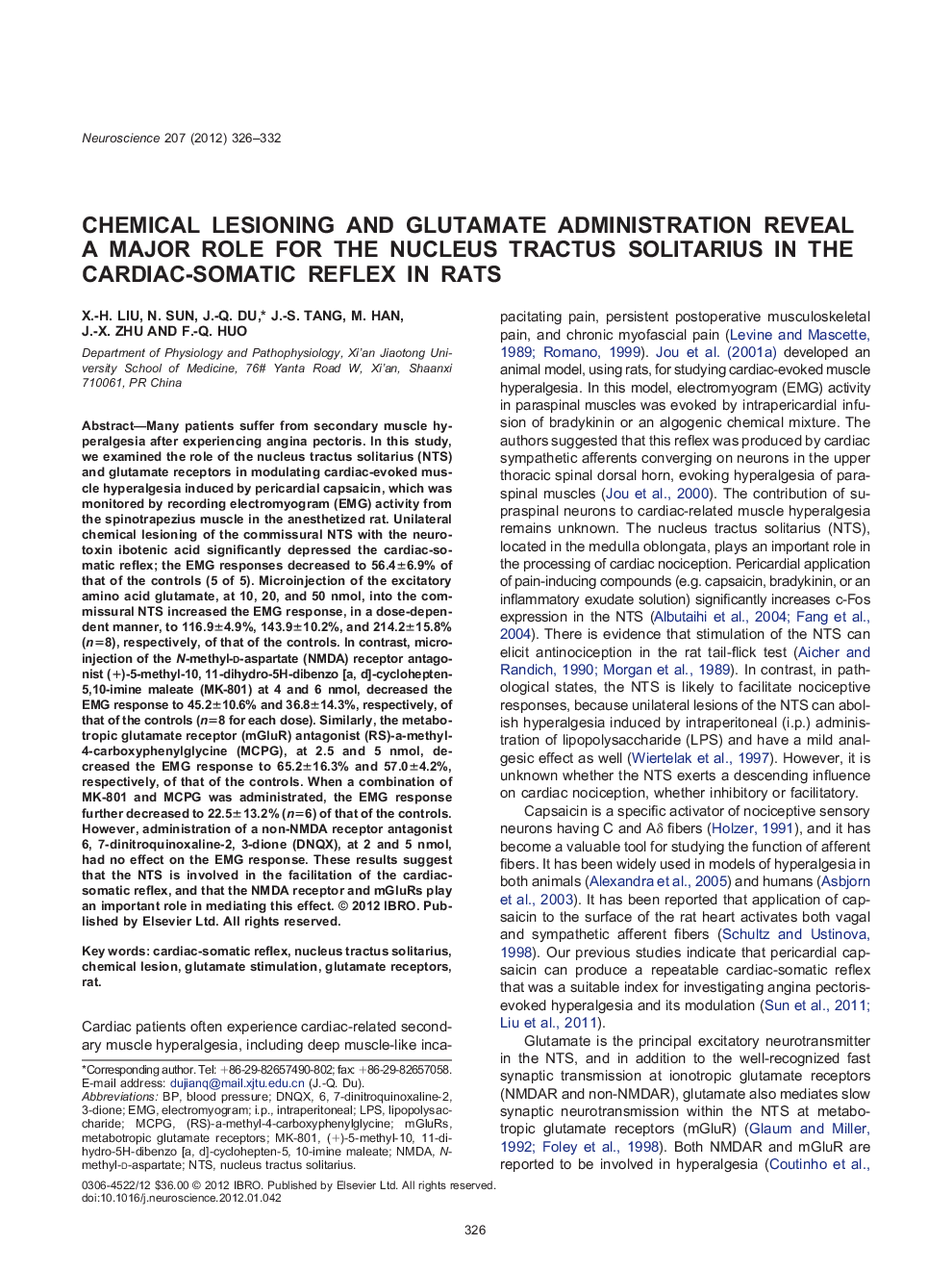| کد مقاله | کد نشریه | سال انتشار | مقاله انگلیسی | نسخه تمام متن |
|---|---|---|---|---|
| 4338600 | 1614869 | 2012 | 7 صفحه PDF | دانلود رایگان |

Many patients suffer from secondary muscle hyperalgesia after experiencing angina pectoris. In this study, we examined the role of the nucleus tractus solitarius (NTS) and glutamate receptors in modulating cardiac-evoked muscle hyperalgesia induced by pericardial capsaicin, which was monitored by recording electromyogram (EMG) activity from the spinotrapezius muscle in the anesthetized rat. Unilateral chemical lesioning of the commissural NTS with the neurotoxin ibotenic acid significantly depressed the cardiac-somatic reflex; the EMG responses decreased to 56.4±6.9% of that of the controls (5 of 5). Microinjection of the excitatory amino acid glutamate, at 10, 20, and 50 nmol, into the commissural NTS increased the EMG response, in a dose-dependent manner, to 116.9±4.9%, 143.9±10.2%, and 214.2±15.8% (n=8), respectively, of that of the controls. In contrast, microinjection of the N-methyl-d-aspartate (NMDA) receptor antagonist (+)-5-methyl-10, 11-dihydro-5H-dibenzo [a, d]-cyclohepten-5,10-imine maleate (MK-801) at 4 and 6 nmol, decreased the EMG response to 45.2±10.6% and 36.8±14.3%, respectively, of that of the controls (n=8 for each dose). Similarly, the metabotropic glutamate receptor (mGluR) antagonist (RS)-a-methyl-4-carboxyphenylglycine (MCPG), at 2.5 and 5 nmol, decreased the EMG response to 65.2±16.3% and 57.0±4.2%, respectively, of that of the controls. When a combination of MK-801 and MCPG was administrated, the EMG response further decreased to 22.5±13.2% (n=6) of that of the controls. However, administration of a non-NMDA receptor antagonist 6, 7-dinitroquinoxaline-2, 3-dione (DNQX), at 2 and 5 nmol, had no effect on the EMG response. These results suggest that the NTS is involved in the facilitation of the cardiac-somatic reflex, and that the NMDA receptor and mGluRs play an important role in mediating this effect.
Graphical Abstract
•
•
•
Figure optionsDownload high-quality image (95 K)Download as PowerPoint slideHighlights▶Pericardiac capsaicin induced cardiac-somatic reflex. ▶Ibotenic acid lesion of NTS depressed the cardiac-somatic reflex. ▶Glutamate activation of NTS facilitated the cardiac-somatic reflex. ▶Blockage of NMDAR and mGluR in NTS depressed the cardiac-somatic reflex. ▶NTS is involved in facilitating the cardiac nociception mediated by NMDAR and mGluR.
Journal: Neuroscience - Volume 207, 5 April 2012, Pages 326–332